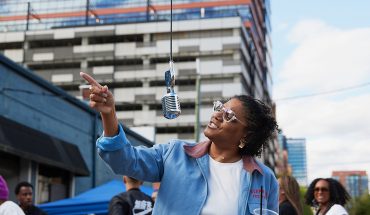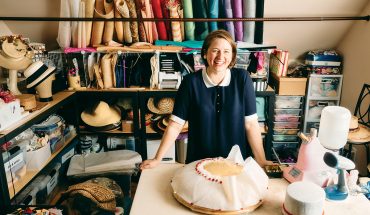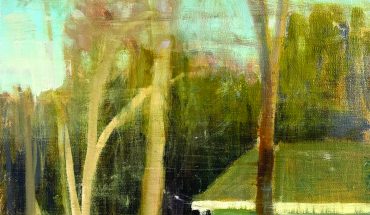by Joyce Fitzpatrick
The late winter sunlight slanted through the old stained glass windows of Raleigh’s First Baptist Church, casting a golden glow. Among a small, quiet group were women in their late 50s who had come to help their friend mourn her father’s death.
He was the last of a dying breed: veterans of World War II, born of hardscrabble but good families, who went to war, came home, married strong women, and fathered even stronger ones.
The minister told the story of how this father, Dick, had taken time off from his job as an emergency room physician to attend a Girl Scout dance with his daughter, our friend, Susan Kelly Nichols, when she was 12. The minister continued: “It seems that the custom was for each father to bring a corsage for his daughter. When they arrived at the dance hall, Susan noticed a table full of corsages made of yellow roses. It turns out that Dick was concerned that not every girl’s father would remember the tradition and that some girls might be embarrassed. So he had seen to it that each girl attending the dance had a corsage of yellow roses.”
Sweet, and tender – but tough. That was Susan’s dad.
But then, we knew about that kind of man.
“What is it that defines us?” we asked each other as fast friends just weeks into our freshman year at UNC Chapel Hill. That question has intrigued us for decades since – years in which we raised our own children, built our own careers, pursued our dreams, and buried our dads.
The answer is in the story of the yellow roses. We had fathers who loved, nurtured and tended to us in ways so gentle and lovely they defy description. They attended no childbirth classes, read no parenting books, and didn’t know Mars from Venus except as celestial navigation tools. Yet somehow, from their own experiences of war and the world, they simply encouraged us to dream – promising we could do anything we wanted. They were patient and kind but no-nonsense. Proud fathers of smart girls.
What we shared seemed more than serendipity. How was it that we flourished? It had to do with how Ed, Jim, Fred, and Dick dared to father us, unfettered by convention and full of optimism.
That day, at the funeral for Susan’s father – the last of the dads to die – we realized that we were standing on the front line now. It was time for taking stock. How did we account for our lives? Our choices to be working mothers? Our confidence? Our strength? Our work ethic?
What was it about these four men and their four daughters who became best friends? One dad a lawyer and chemist; one a basketball coach and college administrator; one an educator; and one a doctor. One daughter an accountant; one a dentist and public health advocate; one a lawyer; and one an entrepreneur.
One by one
First there was Ed. Ed Murray from Baltimore. He had a Canadian mother and a long history on his father’s side where four generations had attended the University at Chapel Hill. After graduating from UNC, he served valiantly in the Army’s 89th Chemical Mortar Battalion at the Battle of the Bulge. During the crossing of the Rhine, he helped lay the largest smoke shield seen in the European Theater allowing the Allies cover to cross over. He won two bronze stars and attained the rank of captain. After the war, he returned to Baltimore and managed the family business, Yaeger’s Drug Company. Frances Louise Murray, his first child, was born on Dec. 7, 1954. She was smart and loved to dance. She remembers Ed as discerning, wise, rugged and real. Summers were spent at Camp Wapomeo in Algonquin Park, near where he had summered as a child in Canada. Three-week canoe trips into the wild were what she was raised on. That and a father who worked hard, but encouraged her in every way.
Next there was Jim. Jim Fitzpatrick grew up in Asheville on the Biltmore Estate, where his father and grandfather worked for Biltmore Dairy. His childhood was spent running through gardens that Frederick Law Olmsted laid out on the 8,000-acre estate. An only child, he lied about his age and enlisted in the Army Air Corps at 17. Based out of Brighton, England, he served in the Mighty Eighth Air Force and completed more than 35 missions as a B-17 ball turret gunner. He returned home and attended Brevard College and the University of Florida on the GI Bill. After graduating, he moved to Winston-Salem and began a long career as a teacher and principal in Forsyth County. Joyce Lee Fitzpatrick, his first child, was born on Oct. 30, 1954. She was feisty. The apple of his eye. Her dreams of her father are of early morning escapes for coffee and to the feed store. Weeding the garden. Fishing at Smith’s pond. Looking for lost golf balls. Never no. Always yes.
And then there was Fred. Fred McCall grew up in Denver, N.C. He was a tall, strapping three-sport athlete at Lenoir-Rhyne College. He graduated from infantry school in Fort Benning, Ga., and then was stationed at Fort Hood training infantry. He served, along with two brothers, as an officer and shipped out to the Philippines just before the end of the war. In 1953 he came to Campbell College in Buies Creek, N.C., where he became head coach of the men’s basketball team, winning more than 220 games in 16 seasons. In 1954, he and Wake Forest Coach “Bones” McKinney founded the Campbell Basketball School, which featured sports greats such as Coach John Wooden of UCLA. Fred’s coaching skills were legendary, and he was inducted into the North Carolina Sports Hall of Fame. Later, he became Campbell’s first vice president for advancement. Leah Ann McCall, his second child, was born on Aug. 10, 1954. She was tall and lithe, bright-eyed and brilliant. She remembers her dad as a magnet for other people. Their house was often filled with college coaches, boosters, and basketball players. He coached Leah and her two sisters to play hard. To win. She did.
Richard Alexander Kelly, Jr. grew up in Louisville, Ky., the son of a Baptist pastor. He went to Wake Forest College and played center of the football team that won the first Gator Bowl in 1946. He interrupted his education to serve as a clerk on an Army hospital ship after World War II. Transporting injured servicemen and their families from the battlefields of Europe to New York through the North Atlantic may not have been a typical experience for a young soldier, but a valuable one for an aspiring doctor. He returned to North Carolina, graduated from Wake Forest, and attended Duke University Medical School. Susan Gail Kelly, his first child, was born on June 13, 1954. Dick adored his little Irish rose. He and wife Patsy settled in Greensboro, where he opened a family practice and then ran the emergency room at Moses Cone Hospital. Susan remembers his corny jokes, his love of gardening and classical music. His encouragement. His million-dollar smile. His generosity. The yellow roses.
Fast friends
On a hot August day in 1972, Ed’s Francie; Jim’s Joyce; Fred’s Leah; and Dick’s Susan met at freshman orientation in Chapel Hill.
That same year, Title IX successfully banned sexual discrimination in college admissions. As a result, UNC-Chapel Hill was transformed. Women, who had made up 30 percent of the total student body, were now admitted on equal terms with men. Practically overnight, the tumultuous change that had danced around their childhoods caused seismic changes on campus. The curriculum was overhauled. Dorm mothers gave way to co-ed dorms and 24-hour visitation by male students. So four young women, daughters of patriots and strong-willed mothers, made their way with few role models. They just set their own course because their dads said they could do it.
Flash forward.
Ed’s Francie, the CPA, is chief financial officer of the Abell Foundation in Baltimore and has managed ground-breaking bio-diesel manufacturing and multi-year litigation with Toyota and Ford that added millions to the Foundation’s endowment. Mother of three, she worked throughout her child-bearing years and is just hitting her stride. Ed would be proud.
Fred’s Leah graduated from UNC in three years, received her dental degree and then a master’s in public health. After many years as N.C. Health Director, she serves now as a professor at UNC’s Gillings School of Global Public Health. She is the mother of one son and has worked tirelessly for many years to improve the public health of North Carolina. She is a trustee at Campbell University, where Fred served so long. How happy he would be.
Jim’s Joyce founded a public relations firm in Washington, D.C., sold it and started another firm in Raleigh. Mother of three, Joyce, too, worked throughout her children’s early years. She helps corporations and institutions in times of crisis and serves on the board of trustees at the North Carolina Museum of Art. Jim would say, “That’s my girl.”
Dick’s Susan attended law school at UNC after a teaching stint in Virginia Beach and gave birth to two sons, practicing law throughout – first at Poyner and Spruill and then for many years in the election law section of the state attorney general’s office. She recently retired, the first of these four to do so. Of his daughter Dick would say, “Well done.”
First Ed died, in 1997. Then Jim in 2006. Fred died in 2010. And now, Dick in 2014.
Their daughters turn 60 this year.
IN PRAISE OF LOST FATHERS
You were there when we needed you.
In the ’50s when dads were supposed to be aloof and absent,
you were there, always comforting.
And, though you were a man’s man, you didn’t crave sons
In the ’60s when our Southern towns were burning and leaders shot down,
you told us we were safe.
Quietly you taught us about equality and justice.
In the ’70s when we started to date boys,
you taught us how a man was to treat a woman.
With respect. With awe. With a sense of humor.
You made us feel as if we were the only girls on earth
You expected a lot from us. You said: It is OK to be smart. OK to beat the boys. Don’t ever lose on purpose. Don’t be like everyone else.
You are beautiful just the way you are!
In the ’80s when we began working, you said:
You can do anything, sister. Let’s go buy a suit for that interview. Let’s make sure you love your work.
But always take time to smell the flowers.
In the ‘90s when we were having our babies you reassured us:
Whatever makes the mother strong makes the children strong.
Then, at the end when we said we need you, don’t leave, you said:
Don’t cry for us when we’re gone.
Your children are all we need of immortality
We should have died in the war.
How lucky we were to make it through.
We saw so much suffering.
But, we came home.
With dreams of you.
And gifts of yellow roses.




